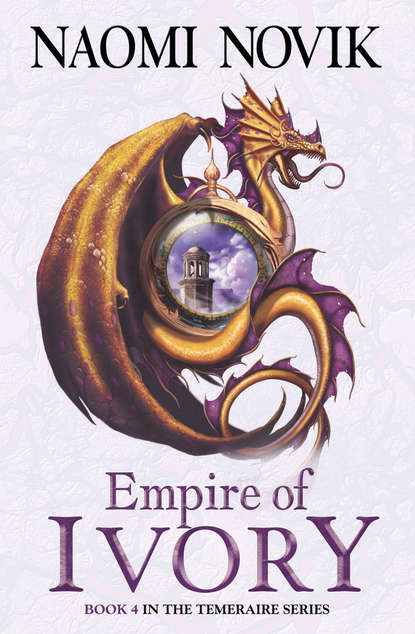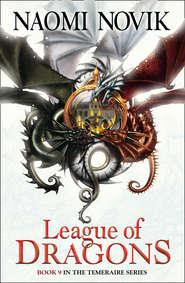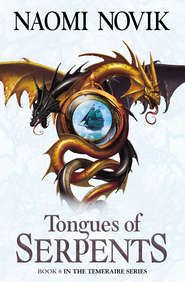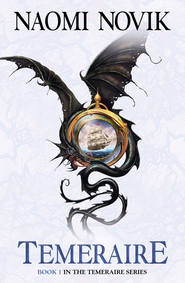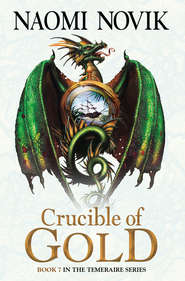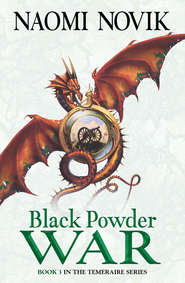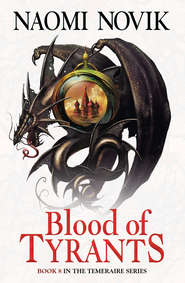По всем вопросам обращайтесь на: info@litportal.ru
(©) 2003-2024.
✖
Empire of Ivory
Автор
Год написания книги
2019
Настройки чтения
Размер шрифта
Высота строк
Поля
‘I do not see how I will be able to do it, without hurting our friends; they are so close to one another, and some of them are so little,’ Temeraire said anxiously, tail lashing as he hovered.
‘Sir,’ Ferris said, and Laurence looked at him. ‘I beg your pardon, sir, but we are always told, as a rule, to take a bruising before a ball; it don’t hurt them long, even if they are knocked properly silly, and we are close enough to give any of them a lift to land, if it should go so badly.’
‘Very good; thank you, Mr. Ferris,’ Laurence said, putting strong approval in it; he was still very glad to see Granby matched off with Iskierka, even more so when dragons would now be in such short supply, but he felt the loss keenly, as exposing the weaknesses in his own abbreviated training as an aviator. Ferris had risen to his occasions with near-heroism, but he had been but a third lieutenant on their departure from England, scarcely a year ago, and at nineteen years of age could not be expected to put himself forward to his captain with the assurance of an experienced officer.
Temeraire put his head down and puffed up his chest with a deep breath, then flung himself down among the shrinking knot of dragons, and barrelled through with much the effect of a cat descending upon an unsuspecting flock of pigeons. Friend and foe alike went tumbling wildly; and thankfully, the ferals, used to rough play, were none of them much the worse for wear, except for being flung into higher excitement. They flew around with much disorderly shrilling for a few moments, and as they did, the French righted themselves: the formation leader waved a signal-flag, and the Poux-de-Ciel wheeled together and away, escaping.
Arkady and the ferals did not pursue, but came gleefully romping back over to Temeraire, alternating complaints at his having knocked them about, with boastful prancing over their victory and the rout of the enemy, which Arkady implied was in spite of Temeraire’s jealous interference. ‘That is not true, at all,’ Temeraire said, outraged, ‘you would have been perfectly dished without me,’ and turned his back upon them and flew towards land, his ruff stiffened up with indignation.
Wringe was sitting and licking at her scarred wing in the middle of a field. A few clumps of bloodstained white wool upon the grass, and a certain atmosphere of carnage in the air, suggested she had quietly found herself some consolation; but Laurence chose to be blind. Arkady immediately set up as a hero for her benefit, and paraded back and forth to re-enact the encounter. So far as Laurence could follow, the battle might have raged a fortnight, and engaged some hundreds of enemy beasts, all of them vanquished by Arkady’s solitary efforts. Temeraire snorted and flicked his tail in disdain, but the other ferals proved perfectly happy to applaud the revised account, though they occasionally jumped up to interject stories of their own noble exploits.
Laurence meanwhile had dismounted; his new surgeon Dorset, a rather thin and nervous young man, bespectacled and given to stammering, was going over Wringe’s injuries. ‘Will she be well enough to make the flight back to Dover?’ Laurence inquired; the scraped wing looked nasty, what he could see of it; she uneasily kept trying to fold it close and away from the inspection, though fortunately Arkady’s theatrics were keeping her distracted enough that Dorset could make some attempt at handling it.
‘No,’ Dorset said absently, with not the shade of a stammer and a quite casual authority. ‘She needs to lie quiet a day or so under a poultice; and those balls must come out of her shoulder presently, although not now. There’s a courier-ground outside Weymouth, which has been taken off the routes and will be free from infection. We must find a way to get her there.’ He let go of her wing and turned back to Laurence blinking watery eyes.
‘Very well,’ Laurence said, bemused; at the change in his demeanour more than the certainty alone. ‘Mr. Ferris, have you the maps?’
‘Yes, sir; though it is twelve miles straight flying to Weymouth covert across the water, sir, if you please,’ Ferris said, hesitating over the leather wallet of maps.
Laurence nodded and waved them away. ‘Temeraire can support her so far, I am sure.’
Her weight posed less difficulty than her unease with the proposed arrangement, and, too, Arkady’s sudden fit of jealousy, which caused him to propose himself as a substitute: quite ineligible, as Wringe outweighed him by several tons, and they should not have lifted him a yard off the ground.
‘Pray do not be so silly,’ Temeraire said, as she dubiously expressed her reservations at being ferried. ‘I am not going to drop you unless you bite me. You have only to lie quiet, and it is a very short way.’
Chapter Three (#ud412e195-467b-578d-8273-5c5fbc121e94)
They reached the Weymouth covert only a little short of dusk, somewhat dispirited. Wringe had expressed her intention seven times during the course of their flight, of climbing off mid-air and flying the rest of the way herself. Then she had accidentally scratched Temeraire twice, in startlement, and had even thrown a couple of the topmen clean off his back with her uneasy shifting. Their lives were saved only by their carabiner-locked straps. On landing, they were both handed down badly bruised and ill from the knocking they had taken, and assisted by their fellows, they limped away to be dosed liberally with brandy at the small barracks-house.
Wringe then put up a fuss upon having the bullets extracted, sidling her hindquarters away when Dorset approached, knife in hand. She insisted that she was quite well, but Temeraire was sufficiently exasperated by now to have lost patience with her evasions, and his low rumbling growl, resonating upon the hard-packed earth, made her flatten to the ground meekly and submit.
‘That will do,’ Dorset said, having pried out the third and final of the balls. ‘Now let’s have some fresh meat for her, just to be sure, and a night’s quiet rest. This dry ground is too hard,’ he added, with disapproval, as he climbed down from her shoulder, the three balls rattling bloodily in his little basin.
‘I do not care if it is the hardest ground in Britain; only let me have a cow and I will sleep,’ Temeraire said wearily, leaning his head so that Laurence could stroke his muzzle while his own shallow cuts were poulticed. He ate the cow in three tremendous tearing gulps, hooves to horns, tipping his head backwards to let the last bite of hindquarters slip down his throat. The farmer who had been prevailed upon to bring some of his beasts to the covert stood paralyzed in macabre fascination, his mouth agape, His two farm-hands stood likewise, their eyes starting from their heads. Laurence pressed a few more guineas into the man’s unresisting hand and hurried them all off; it would do Temeraire’s cause no good to have fresh and lurid tales of draconic savagery spreading.
The ferals disposed of themselves directly around the wounded Wringe, sheltering her from any draft and pillowing themselves one upon the other as comfortably as they could manage, the smaller ones among them crawling upon Temeraire’s back directly he had fallen asleep.
It was too cold to sleep out, and they had not brought tents with them on patrol; Laurence meant to leave the barracks, small enough in all conscience without dividing off a captain’s partition, to his men, and take himself to a hotel, if one might be had; in any case he would have been glad of a chance to send word back to Dover by the stage, that their absence would not occasion distress. He did not trust any of the ferals to go alone, yet, with their few officers so unfamiliar.
Ferris approached as Laurence made inquiry of the few tenants of the covert. ‘Sir, if you please, my family are here in Weymouth; I am sure my mother would be very happy if you chose to stay the night,’ he said, adding, with a quick, anxious glance that belied the easy way in which he issued this invitation, ‘I should only like to send word ahead.’
‘That is handsome of you, Mr. Ferris; I would be grateful, if I should not be putting her out,’ Laurence said. He did not miss the anxiety. It was likely that Ferris felt compelled to make the invitation out of courtesy, and would have done so even if his family had not so much as an attic corner and a crust of bread to spare. Most of his younger gentlemen, indeed most of the Corps, were drawn from the ranks of what could only be called the shabby-gentility. He knew that they were inclined to think him higher than he himself did: his father kept a grand state, certainly, but Laurence had not spent three months together at home since taking to sea, without much sorrow inflicted on either side, except perhaps for his mother’s, and so he was better accustomed to a hanging berth than a palace.
Even so, he would have spared Ferris out of sympathy but for the likely difficulty of finding other lodgings; and his own weary desire to be settled, even if it were indeed in an attic corner, with a crust of bread. With the noise of the day behind them, he was finding it difficult not to yield to a lowness of spirit. The ferals had behaved as badly as expected, and he could not help but think how impossible it would be to guard the Channel with such a company. The contrast to the fine and ordered ranks of British formations could not have been greater. But those ranks were now decimated, and he felt their absence keenly.
The word was sent accordingly and a carriage was summoned. It was waiting outside the covert gates by the time they had gathered their things and walked to meet it down the long narrow path which led away from the dragon-clearings.
A twenty minute drive brought them to the outskirts of Weymouth. Ferris grew more hunched as they bowled along, and became so miserably white that Laurence might have thought him taken ill with motion sickness if he had not known Ferris to be perfectly settled through thunderstorms aloft and typhoons at sea. He was not likely to be distressed by the motion of a comfortable, well-sprung chaise. The carriage turned, then, drawing into a heavily wooded lane. Shortly the forest parted and they drew abreast of the house: a vast and sprawling gothic edifice, its blackened stone barely visible behind centuries of ivy; the windows illuminated, threw a beautiful golden light onto a small ornamental brook which wound through the open lawn before the house.
‘A very fine prospect, Mr. Ferris,’ Laurence said as they rattled over the bridge. ‘You must be sorry not to be at home more often. Has your family resided here long?’
‘Oh, for an age,’ Ferris said, blankly, lifting his head. ‘It was built by some crusader or other, I think, I don’t much know.’
Laurence hesitated and then a little reluctantly offered, ‘My father and I have disagreed on occasion, I am sorry to say, so I am not often at home.’
‘Mine is dead,’ Ferris said. After a moment, he seemed to realize that this was rather an abrupt period to the conversation, and so added with some effort, ‘My brother Albert is a good sort, I suppose, but he has ten years on me and so we have never really come to know one another.’
‘Ah,’ Laurence said, left no more the wiser as to the cause of his dismay.
There was certainly nothing lacking in their welcome. Laurence had braced himself for the usual neglect. He expected to be shown directly to rooms out of sight of the rest of the company and was even tired enough now to hope to be slighted. But nothing of the sort: a dozen footmen were out with their lights lining the drive, another two waiting with the step to hand them down, and a substantial body of the staff coming outside to greet them despite the cold and what must surely have been a full house within to manage, a wholly unnecessary ostentation.
Ferris blurted desperately, just as the horses were drawn up, ‘Sir – I hope you will not take it to heart, if my mother – She means well—’ The footmen opened the door, and discretion forced Ferris’s mouth closed.
They were shown to the drawing-room and found company assembled to meet them: not very large, but decidedly elegant. The women wore clothing of an unfamiliar style, the surest mark of the height of fashion to a man who was often separated from society for a year at a time. Several of the gentlemen bordered on outright dandyism. Laurence noted it all mechanically; he wore trousers and Hessians himself, and those were dust-stained, but he could not be brought to care very much, even when he saw that the other gentlemen were dressed more formally in knee-breeches. There were also a couple of military men among their number, a colonel of the marines whose long, seamy, sun-leathered face held a vague familiarity that most likely meant they had dined together on one ship or another, and a tall army captain in a red coat, stood near him, lantern-jawed and blue-eyed.
‘Henry, my dear!’ A tall woman rose from her seat to come and greet them with both her hands outstretched: too like Ferris to mistake her, with the same high forehead and reddish-brown hair, and the same trick of holding her head very straight, which made her neck look longer. ‘How happy we are you have come!’
‘Mother,’ Ferris said, woodenly, and bent to kiss her obliging cheek. ‘May I present Captain Laurence? Sir, this is Lady Catherine Seymour, my mother.’
‘Captain Laurence, I am overjoyed to make your acquaintance,’ she said, offering him her hand.
‘My lady,’ Laurence said, giving her a formal leg. ‘I am very sorry to intrude upon you; I beg you will forgive us arriving in all our dirt.’
‘Any officer of His Majesty’s Aerial Corps is welcome in this house, Captain,’ she declared, ‘at any moment of day or night, I assure you, and should he come with no introduction at all, he should be welcome still.’
Laurence did not know what to say to this. He would no more have descended upon a strange house without introduction than loot one. The hour was late, but not uncivilized, and he was accompanied by her own son, so found such reassurances to be unnecessary, but having been invited and welcomed, he settled on a vague, ‘Very kind.’
The company was not similarly effusive. Ferris’s eldest brother Albert, the present Lord Seymour, was a little haughty. He made the early point, when Laurence complimented his house, of conveying that the house was called Heytham Abbey, and had been in their possession since the reign of Charles II. The head of the family had risen from knight to baronet to baron in a steady climb, and had there remained.
‘I congratulate you,’ Laurence said, dismissing the obvious opening to puff about his own consequence; he was an aviator now, and knew well that such evil outweighed any other considerations in the eyes of Society. He could not help but wonder why they should have sent a son to the corps; there was no sign of it being an encumbered estate: while appearances might be sustained on credit, so extravagant a number of servants could not have been managed.
Dinner was announced shortly after they arrived, to Laurence’s surprise; he had hoped for nothing more than a little cold supper, and thought it late even for that much. ‘Oh, think nothing of it, we are grown modern, and often keep town hours even when we are in the country,’ Lady Catherine cried. ‘We have so much company from London that it would be tiresome for them to be constantly adjusting their dinner-hour. Dishes would be sent away half-eaten, only to be wished for later. Now, we will certainly not stand on formality; I must have Henry beside me, for I am longing to hear all you have been doing, my dear, and Captain Laurence, you shall escort Lady Seymour, of course.’
Laurence could only bow politely and offer his arm, although Lord Seymour certainly ought to have preceded him, even if Lady Catherine chose to make a natural exception for her younger son. Her daughter-law looked for a moment as if she were going to balk at the offer, but then she laid her hand on his arm without any further hesitation, and he chose not to notice.
‘Henry is my youngest, you know,’ Lady Catherine said to Laurence over the second course; he was on her right. ‘Second sons in this house have always gone to the drum, and the third to the Corps, and I hope that may never change.’ This, Laurence thought might have been subtly directed at his dinner companion, but Lady Seymour gave no sign that she had heard her mother-in-law as she continued to speak with the gentleman on her right, the army captain, who was Ferris’s other brother, Richard. ‘I am very glad, Captain Laurence, to meet a gentleman whose family feels as I do on the matter.’
Laurence, who had only narrowly escaped being thrown from his house by his irate father due to his shift in profession, could not in honesty accept this compliment, and with some awkwardness said, ‘Ma’am, I beg your pardon, I must confess you do us credit and yet we have not earned it. Younger sons in my family are supposed to go to the Church, but I was mad for the sea, and would have no other.’ He was then forced to explain his accidental acquisition of Temeraire and subsequent transfer to the Aerial Corps.
‘I will not withdraw my remarks, sir. It is even more to their credit that you have principle enough to do your duty when it was presented to you,’ Lady Catherine said firmly. ‘It is shameful, the disdain that so many of our finest families profess for the Corps, and I will never hold with them in the least.’
The dishes were being changed once again as she made this ringing and overly-loud speech. Laurence noticed, baffled, that they were returning nearly untouched after all. The food had been excellent, therefore he could only conceive that Lady Catherine’s protestations were humbug, and that they had already dined earlier in the evening. He watched covertly as the next course was dished out, and indeed, the ladies in particular, picked unenthusiastically at the food, scarcely bothering to uphold the pretence of conveying morsels to their mouths. Of the gentlemen only Colonel Prayle seemed to make any serious progress. He caught Laurence looking and gave him just the slightest wink, then continued eating with the steady trencherman rhythm of a professional soldier, used to taking advantage of any food when it was before him.
If they had been a large party, coming late to an empty house, Laurence might have understood a gracious host holding back dinner for their convenience, or serving them a later second meal at the table, but the assumption that they might have been offended by a simple private supper, when the rest of the company had already dined, was absurd. He was obliged to sit through several more removes, uncomfortably aware that they were a pleasure for no one else. Ferris ate sparingly, with his head down; ordinarily he possessed as rapacious an appetite as any nineteen-year-old boy unpredictably fed of late.
When the ladies departed to the drawing room, Lord Seymour began to offer port and cigars, with a determined, if false, note of heartiness. Laurence refused all but the smallest glass for politeness’ sake. No one objected to rejoining the ladies quickly, most of them had already started to droop by the fire even though not half an hour had elapsed.
No one proposed cards or music; the conversation was low and leaden. ‘How dull you all are tonight!’ Lady Catherine rallied them, with a nervous energy. ‘You will give Captain Laurence a quite disgusting impression of our society.





